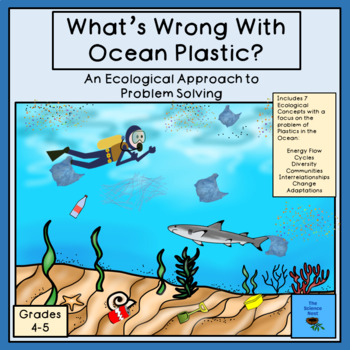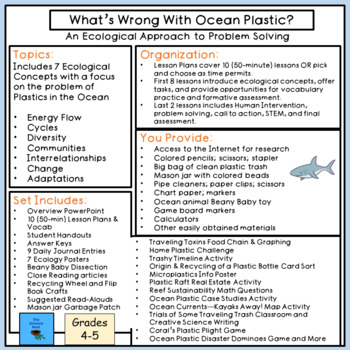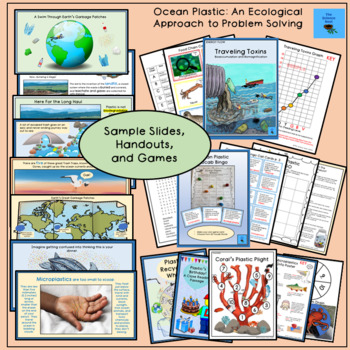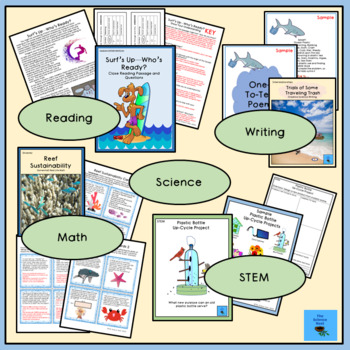What's Wrong With Ocean Plastic: An Ecological Approach to Problem Solving
- Zip
- Easel Assessment
Description
In this science Unit for Grades 4 and 5, we start with a current environmental problem, plastic pollution in the ocean, and look at seven key ecological concepts to discover possible solutions.
All things are connected. Without a doubt, what humans do to one part of an ecosystem will ultimately affect another.
Understanding these 7 ecological concepts is critical to conceptualizing the big picture of ecological success. Without this understanding, hasty solutions sometimes create even more environmental problems.
Students work through each ecological concept: Energy Flow, Cycles, Diversity, Communities, Interrelationships, Change, and Adaptation, gathering information about environmental pollution, ocean currents, and the plastic crisis, making important connections about how the natural world works and the effects resulting from human actions. They’ll explore the environmental problem with engaging, hands-on activities, discover some possible causes of the problem, which usually involve their own behaviors, record their findings in an organized Student Handbook, and answer Journal Prompts to show their understanding. The Unit culminates with a written Assessment, creative Science Writing, and a Plastic Bottle Up-Cycle STEM Project so students can start using their newly gained understanding right away. All Answer Keys included.
This 10-day lesson on Ocean Plastics includes a variety of activities, focusing on the 7 concepts in the context of a major environmental problem that the world is currently facing and must address in the decades to come. You can use this unit, or any of the other “What’s Wrong With” units, to teach and reinforce ecological concepts efficiently and to develop an understanding of how human actions affect different living organisms. Each “What’s Wrong With” Unit is full of unique, engaging activities to help students to see the big ecological picture and to learn a process to begin making informed environmental decisions on their own.
Your Download Includes:
- •Introduction PowerPoint
- •10 (50-min) Lesson Plans and Overview Grid
- •Student Handout packet
- •Answer Keys
- •9 Daily Journal Entries
- •7 colorful Ecology Posters
- •Vocab Bingo
- •Beany Baby Dissection (Look inside of a plastic-eater)
- •Close Reading articles on the origin of plastics, bioaccumulation and biomagnification, and two organizations working toward change
- •Recycling Wheel and Flip Book Crafts
- •Suggested Read-Alouds
- •Mason Jar Garbage Patch
- •Suggested STEM Activity: Up-Cycle Plastic Bottle Project
- •Traveling Toxins Food Chain Task & Graphing
- •Home Plastic Challenge (Can we live without it)
- •Trashy Timeline Activity (How long to break down)
- •Origin & Recycling of a Plastic Bottle Card Sort
- •Microplastics Info Poster and blank template for notes
- •Plastic Raft Real Estate Activity (Who lives in The Patch)
- •Reef Sustainability Math Questions (Real-life scenarios)
- •Ocean Plastic Case Studies Activity (Real-life plastic spills at sea)
- •Ocean Currents—Kayaks Away! Map Activity (Label the World Map)
- •Trials of Some Traveling Trash Classroom Task and Creative Science Writing (Follow the trash trail; share knowledge in a creative Travel Log)
- •One-To-Ten Poem Template and Sample
- •Coral’s Plastic Plight Game (How plastic harms coral reefs)
- •6R’s to a solution (Reduce, Reuse, Recycle, and 3 more!)
- Ocean Plastic Disaster Dominoes Game (One action creates another)
- Paper/Pencil Assessment AND Easel Assessment
Though ocean plastic is a serious environmental problem, this unit ends on a positive note with constructive actions students can begin right away and skills to empower them for their future.






